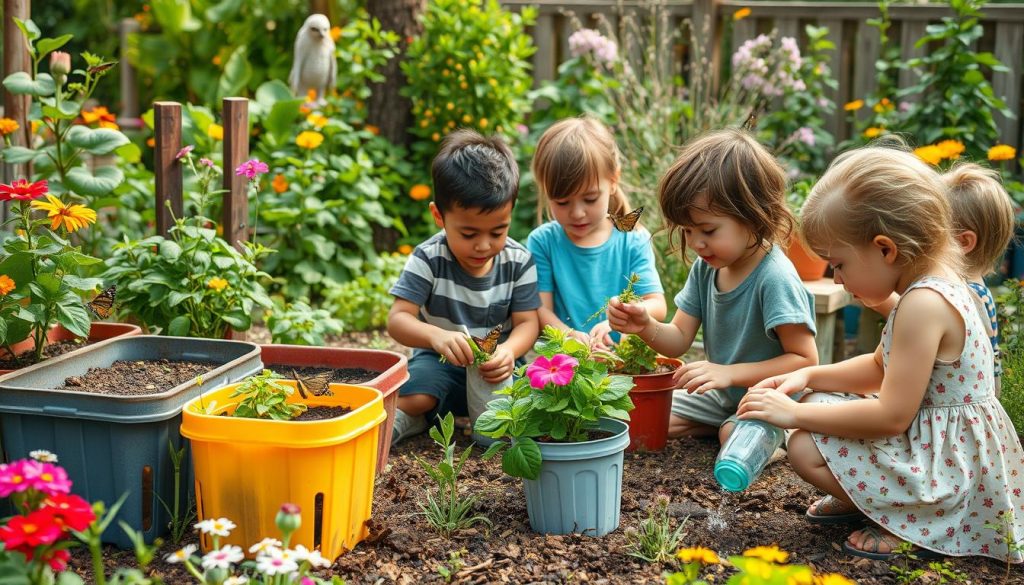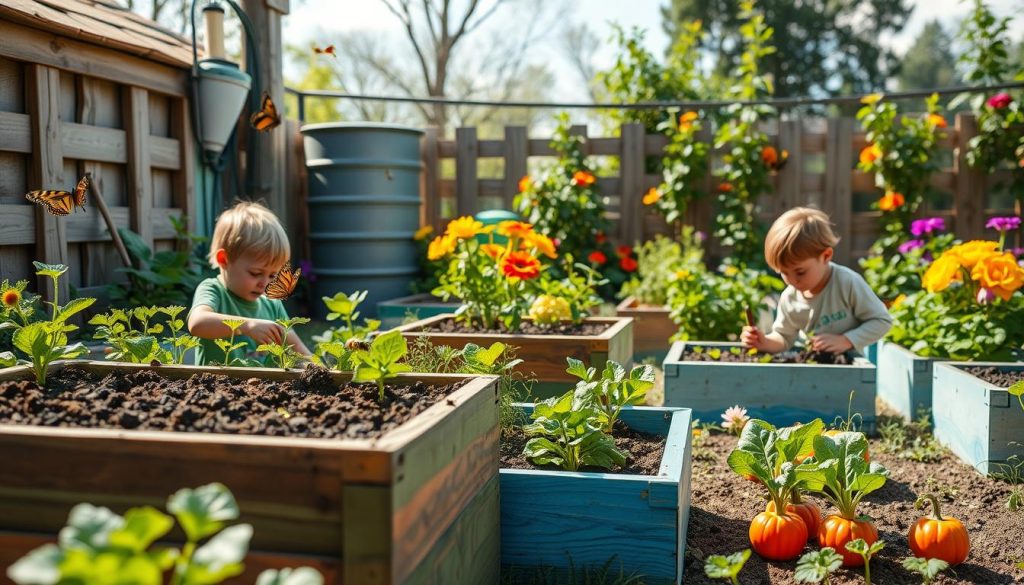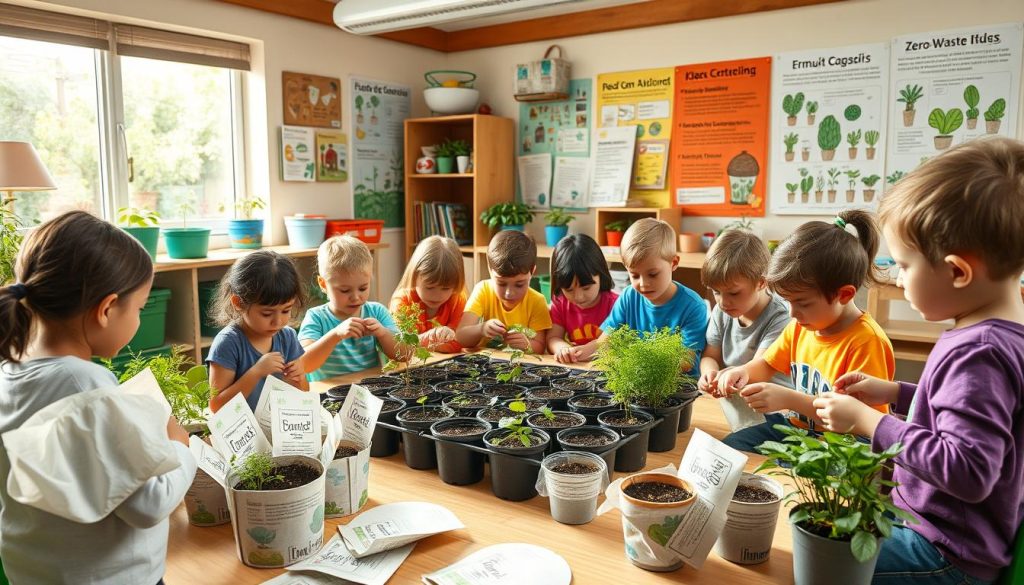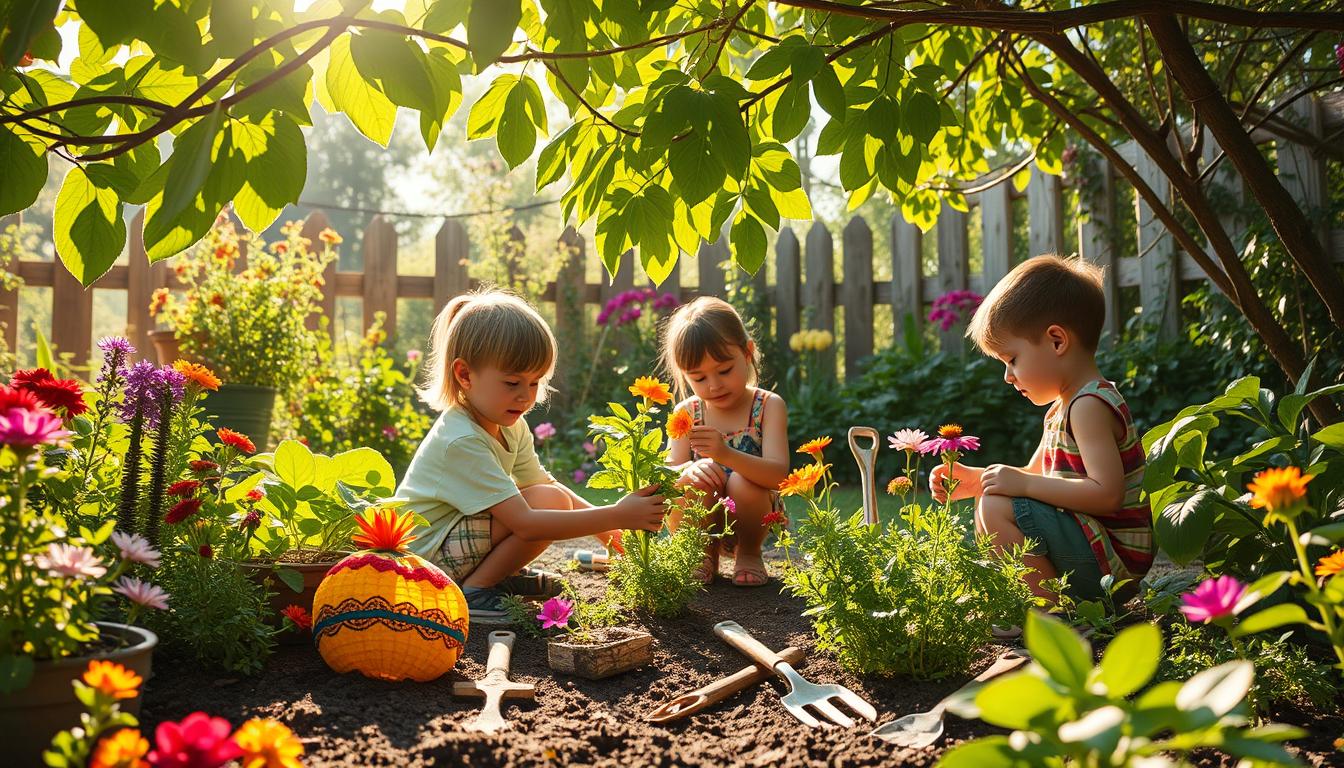I’m excited to share how I teach kids about zero-waste gardening. This practice helps reduce waste and promotes sustainability. It’s essential to make it kid-friendly, so children can easily join in.
Teaching kids about zero-waste gardening is key. It helps them appreciate the environment and see how their actions affect it. By doing zero-waste gardening, kids learn about conservation and sustainability.
My journey has shown that teaching kids about zero-waste gardening benefits them and the environment. It helps them develop skills like responsibility and critical thinking. Plus, they have fun while learning about the importance of zero-waste gardening.
The Importance of Zero-Waste Gardening for Kids
As a parent, I’ve learned how crucial it is to teach kids about waste and its effects on our planet. By showing them eco-friendly gardening, we help them grasp sustainability and conservation. Kids who garden often understand these concepts better.
Teaching kids about reducing waste and eco-friendly habits is key. We can do this by involving them in composting, recycling, and using green materials in their gardens. This way, they learn valuable skills and values for life.

Understanding Waste and Its Impact
It’s vital to teach kids about waste’s harm to our environment and how they can help lessen it. By learning about recycling, composting, and green materials, they can make a difference.
Benefits of Gardening for Children
Gardening is great for kids, teaching them responsibility, patience, and teamwork. It also lets them connect with nature, sparking curiosity and wonder.
Connecting with Nature
Engaging kids in eco-friendly gardening helps them appreciate nature more. It creates a bond with the natural world, inspiring them to care for it and learn about sustainability.
Getting Started with Zero-Waste Practices
To start our zero-waste gardening journey, we need to learn about composting and using kitchen scraps. These methods not only cut down on waste but also make our soil rich for plants. It’s a great way to teach kids about gardening and help the environment.
Composting is easy. It involves breaking down organic stuff into a soil that’s full of nutrients. We can start by collecting kitchen scraps like fruit and veggie peels. Then, we add them to a compost bin. This makes gardening fun for kids and teaches them about reducing waste.
Composting Basics for Kids
- Collect kitchen scraps, such as fruit and vegetable peels
- Add scraps to a compost bin or pile
- Mix with other organic materials, such as leaves or grass clippings
- Wait for the materials to break down into a nutrient-rich soil amendment
By following these steps, we can make composting fun and educational for kids. This approach helps us raise gardeners who care about the environment and a sustainable future.
Hands-On Activities to Engage Kids
As a parent, I’ve learned that hands-on activities are great for engaging kids and teaching them through experience. Zero-waste gardening offers many fun projects for kids to enjoy while learning about sustainability. These activities help teach them about reducing waste and living sustainably.
Getting kids involved in gardening is easy with hands-on activities that spark creativity and curiosity. Teaching them about sustainability through gardening is key. It helps them appreciate the environment and its importance. Some of my favorite activities include:
- Planting a seed starting station, where kids can watch their seeds grow and learn about the life cycle of plants
- Creating recycled planters, which teaches kids about the importance of reusing and recycling materials
- Making a nature journal, where kids can record their observations and drawings of the natural world
These activities not only promote sustainability but also foster creativity and curiosity in kids. By using zero-waste tips for kids garden projects, we can inspire a lifelong love of gardening and a deeper appreciation for the environment. 
Teaching Kids About Sustainable Materials
I’m working on a zero-waste gardening curriculum for kids. It’s all about teaching them to use sustainable materials in the garden. This means learning about biodegradable and non-biodegradable items. Plus, they’ll learn to upcycle household items into garden tools and decorations.
Using sustainable materials helps reduce waste and protects the environment. I want to teach kids to make eco-friendly choices every day. My curriculum will include hands-on activities and lessons on sustainable materials.
- Creating compost bins using recycled materials
- Building garden planters from biodegradable materials
- Upcycling old household items into garden decorations
My goal is to give kids the knowledge and skills for a sustainable future. 
Kids will learn the benefits of sustainable materials and how to use them in their gardens. By choosing sustainable options, they help the environment. They’ll also develop a love for nature and conservation that lasts a lifetime.
Building a Community Around Gardening
Sharing my love for zero-waste gardening with kids has shown me how vital community is. Gardening with kids teaches them responsibility and social skills. It also helps them feel part of a group. Community gardens bring people together, creating unity and teamwork.
Getting friends and family involved in gardening is a great start. Hosting a gardening party or inviting neighbors can be fun. Kids learn to communicate, solve problems, and work together. They also get to learn from others and share their own knowledge.
Involving the Community
- Participate in local gardening events, such as farmers’ markets or gardening workshops
- Join a community garden or start one in your own neighborhood
- Invite friends and family to join in on gardening activities, such as planting or harvesting
Creating a community around gardening supports kids’ learning and growth. Gardening teaches them important skills and fosters a sense of community. It’s a way to teach kids about social responsibility.
Celebrating Our Gardening Successes
As we wrap up our zero-waste gardening journey, let’s celebrate our wins. Seeing our garden grow and thrive shows the effort we’ve put in. It’s a true testament to our hard work and dedication.
Harvesting and Sharing with Others
Harvesting our garden’s bounty is incredibly rewarding. Sharing tomatoes with neighbors or giving herbs to loved ones brings us joy. It connects us with our community and reduces food waste.
Reflecting on Our Zero-Waste Journey
Looking back on our journey, we see how far we’ve come. We’ve learned a lot, from composting to upcycling. Keeping a journal or scrapbook helps us remember our progress and stay inspired.

